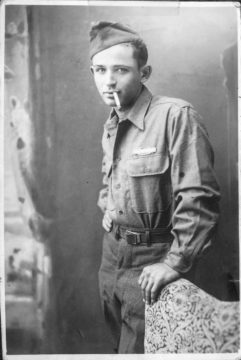David Denby in The New Yorker:
 When Norman Mailer was inducted into the Army, in March, 1944, he was a freshly married twenty-one-year-old Harvard graduate, a slight young man of five feet eight inches and a hundred and thirty-five pounds. In the previous few years, he had published some stories and written a play and two novels (one of them published, in a typescript facsimile, as “A Transit to Narcissus,” in 1978). Even as a student, he thought of himself as a professional writer, and from the day that Japan attacked Pearl Harbor, in December, 1941, he had wanted to write a big book about the war. He was sent for basic training to Fort Bragg, North Carolina, where many of the men were from Pennsylvania, the South, and the Upper Midwest. Mailer was from middle-class Jewish Brooklyn; he had landed in the great working-class Gentile world, and was eager to observe. He canvassed the recruits about their sex lives, taking notes on a yellow legal pad. (He discovered that many of them did not believe in foreplay.) Mailer knew that tough Jews served in the war, including criminals, louts, and bitterly determined, hardworking men, but he was without physical skills. He had never worked a thresher, or manhandled heavy goods into a truck, or tinkered with Dad’s jalopy.
When Norman Mailer was inducted into the Army, in March, 1944, he was a freshly married twenty-one-year-old Harvard graduate, a slight young man of five feet eight inches and a hundred and thirty-five pounds. In the previous few years, he had published some stories and written a play and two novels (one of them published, in a typescript facsimile, as “A Transit to Narcissus,” in 1978). Even as a student, he thought of himself as a professional writer, and from the day that Japan attacked Pearl Harbor, in December, 1941, he had wanted to write a big book about the war. He was sent for basic training to Fort Bragg, North Carolina, where many of the men were from Pennsylvania, the South, and the Upper Midwest. Mailer was from middle-class Jewish Brooklyn; he had landed in the great working-class Gentile world, and was eager to observe. He canvassed the recruits about their sex lives, taking notes on a yellow legal pad. (He discovered that many of them did not believe in foreplay.) Mailer knew that tough Jews served in the war, including criminals, louts, and bitterly determined, hardworking men, but he was without physical skills. He had never worked a thresher, or manhandled heavy goods into a truck, or tinkered with Dad’s jalopy.
In early January, 1945, General Douglas MacArthur landed with an enormous invasion force on Luzon, the largest of the Philippine islands; Mailer, after waiting in a troopship, went ashore a few weeks later. He was thrown as a rifleman into the 112th Cavalry Regiment, out of Texas. The 112th had been in combat in the Pacific for more than a year, and many men in the unit had died. Mailer described those who remained as a little crazy, and physically messed up—some with open ulcers from jungle rot. The Texans were joined by men from other parts of the country, some of them bar fighters and casual anti-Semites (not by theory but by habit). “I didn’t open my mouth for six months in that outfit,” he later said.
More here.
